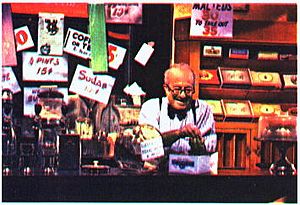Mr. Hooper facts for kids
Quick facts for kids Harold Hooper |
|
|---|---|
| Sesame Street character | |

Mr. Hooper in his store
|
|
| First appearance | November 10, 1969 |
| Last appearance | 1983 |
| Portrayed by | Will Lee |
| Information | |
| Aliases | Mr. Hooper (often mispronounced by Big Bird as "Cooper," "Looper," etc.) |
| Species | Human |
| Gender | Male |
Mr. Harold Hooper was one of the first human characters on the TV show Sesame Street. An actor named Will Lee played him. Mr. Hooper owned Hooper's Store. This was a neighborhood shop and diner where Muppets and humans often met.
Will Lee was a great choice for Mr. Hooper. He was a character actor and a teacher. Mr. Hooper was known for being a bit grumpy but very kind. He helped connect older and younger viewers. His store was like an extension of his friendly personality. He had a special friendship with the Muppet Big Bird.
When Will Lee passed away, the creators of Sesame Street faced a big decision. Instead of replacing the actor or saying Mr. Hooper moved away, they decided to teach kids about death. They did a lot of research. Experts in child psychology and religion helped them. They wanted to make sure the episode would help young viewers understand. Studies after the episode showed that most children understood the message. They also did not have any bad long-term effects.
The head writer, Norman Stiles, wrote the episode. It aired on Thanksgiving Day in 1983. The cast and crew said filming it was very emotional. This episode became a guide for how children's shows could handle tough topics. It was called a sad but hopeful moment in the show's history.
Saying Goodbye to Mr. Hooper
Will Lee, the actor who played Mr. Hooper, died on December 7, 1982. The producers of Sesame Street had to decide what to do. They could have found a new actor for Mr. Hooper. Or they could have said he moved or retired. But they chose to create an episode that taught young viewers about death.
The show's executive producer, Dulcy Singer, said they wanted to be "honest and straightforward." They wanted to deal with the topic directly. This was one of many important social issues Sesame Street has talked about over the years.
What Happened in the Special Episode?
The special Sesame Street episode (number 1839) was structured like other episodes. It had scenes on the main brownstone set. It also had short puppet skits and animations.
The episode starts with Gordon and Forgetful Jones. Gordon helps Forgetful remember something happy. Later, Big Bird is walking backward with his head between his legs. Gordon asks him why, and Big Bird just says, "Just because." Soon, Big Bird hears the adults talking about a new baby coming to Sesame Street.
Later, Big Bird shows pictures he drew to the adults. These include Maria, David, Bob, Susan, Gordon, Luis, and Olivia. He gets to Mr. Hooper's picture. Big Bird says he will give it to Mr. Hooper when he returns.
Then, Maria explains to Big Bird that Mr. Hooper has died. She tells him that Mr. Hooper will not be coming back. Big Bird gets very upset and confused. The adults tell him they love him and will take care of him. David shares that Mr. Hooper left the store to him in his will. Big Bird asks, "Why does it have to be this way? Give me one good reason!" Gordon answers, "Big Bird, it has to be this way... just because."
Big Bird looks at Mr. Hooper's picture. He says, "I'm going to miss you, Mr. Looper." He mispronounces Mr. Hooper's name, as he often did. Maria gently corrects him. Everyone gathers around Big Bird to comfort him.
The episode ends with Big Bird hanging Mr. Hooper's picture near his nest. Luis brings the new baby to Big Bird's door. The whole group of adults comes too. Big Bird says, "You know what the nice thing is about new babies? One day they're not here, and the next day, here they are!" The cast shows affection to the baby as the show closes.
How They Researched the Episode
The Children's Television Workshop (CTW) researched how young children understand death. This was similar to how they researched other important topics for the show.
First, they brought together a team of experts. These experts knew a lot about child psychology, child development, and religion. This team advised the writers and producers. They helped them decide how to talk about death. The experts suggested giving viewers a clear sense of closure. They decided not to explain how Mr. Hooper died. This was because talking about illness might make children more afraid of death.
They chose to deal with his death in just one episode. They wanted to share simple messages:
- "Mr. Hooper is dead."
- "Mr. Hooper will not be coming back."
- "Mr. Hooper will be missed by everyone."
The CTW did studies before the episode aired. They wanted to answer four main questions: 1. Would children understand the messages about death? 2. Would they pay attention to the story? 3. How would parents react to such a sensitive topic? 4. Would children be upset by the messages, and for how long?
The researchers found that most 4- and 5-year-olds understood Mr. Hooper was dead. They also understood he was not coming back. Most children paid close attention during the episode. Parents had very positive reactions to the show. About half of them talked about death with their children after watching. No parents reported negative reactions from their children.
 | Mary Eliza Mahoney |
 | Susie King Taylor |
 | Ida Gray |
 | Eliza Ann Grier |

